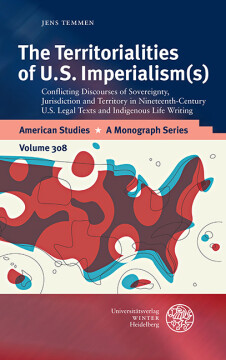
BUCH
The Territorialities of U.S. Imperialism(s)
Conflicting Discourses of Sovereignty, Jurisdiction and Territory in Nineteenth-Century U.S. Legal Texts and Indigenous Life Writing
American Studies – A Monograph Series, Bd. 308
2020
Zusätzliche Informationen
Bibliografische Daten
Abstract
‘The Territorialities of U.S. Imperialism(s)’ sets into relation U.S. imperial and Indigenous conceptions of territoriality as articulated in U.S. legal texts and Indigenous life writing in the 19th century. It analyzes the ways in which U.S. legal texts as “legal fictions” narratively press to affirm the United States’ territorial sovereignty and coherence in spite of its reliance on a variety of imperial practices that flexibly disconnect and (re)connect U.S. sovereignty, jurisdiction and territory. At the same time, the book acknowledges Indigenous life writing as legal texts in their own right and with full juridical force, which aim to highlight the heterogeneity of U.S. national territory both from their individual perspectives and in conversation with these legal fictions. Through this, the book’s analysis contributes to a more nuanced understanding of the coloniality of U.S. legal fictions, while highlighting territoriality as a key concept in the fashioning of the narrative of U.S. imperialism.
Inhaltsverzeichnis
| Zwischenüberschrift | Seite | Aktion | Preis |
|---|---|---|---|
| Cover | Cover | ||
| Titel | III | ||
| Imprint | IV | ||
| Table of Contents | V | ||
| Acknowledgments | IX | ||
| 1. Introduction: The Territorialities of U.S. Imperalism(s | 1 | ||
| 1.1 Has the Constitution Ever Followed the Flag? Making a Case for the Continuity of Fluidity | 17 | ||
| 1.1.1 The Messy Genealogy of the Westphalian Nation-State and the Incorporation of Indigenous Territories | 25 | ||
| 1.1.2 Upsetting the “Idea of 1898”: The Overthrow of the Hawaiian Monarchy | 41 | ||
| 1.2 Culture as Law and Indigenous Life Writing | 45 | ||
| 1.3 Reading Across Indigenous Perspectives: Potentials and Pitfals | 56 | ||
| 1.4 Embracing Limitations: Positionalities and the Analysis of Indigenous Life Writing and U.S. Imperialism(s) | 65 | ||
| 2. Overriding/Overwriting U.S. Sovereignty: John Rollin Ridge’s ‚The Life and Adventures of Joaquín Murieta‘ | 69 | ||
| 2.1 Poetic License and Legal Fictions in U.S. Federal Indian Law | 74 | ||
| 2.1.1 Overriding Sovereignty in the Marshall Trilogy | 76 | ||
| 2.1.2 Poetic Justice in ‚Joaquín Murieta‘ | 86 | ||
| 2.2 Overriding/Overwriting the Law in ‚Joaquín Murieta‘ | 94 | ||
| 2.2.1 Domesticity and Sovereignty in ‚Joaquín Murieta‘ | 95 | ||
| 2.2.2 “An author who acted out his own tragedies”: ‚Joaquín Murieta‘ as a Legal Text | 105 | ||
| 2.2.3 Haunted by ‚Cherokee Nation‘: John Rollin Ridge’s Verdict in ‚Joaquín Murieta‘ | 111 | ||
| 3. Disavowing Sovereignty to Strengthen It: Geronimo’s and Stephen M. Barrett’s ‚Geronimo’s Story of His Life‘ | 121 | ||
| 3.1 The Treaty of Guadalupe Hidalgo in ‚Geronimo’s Story of His Life‘ | 134 | ||
| 3.2 Western Domesticity and Apache Sovereignty | 141 | ||
| 3.3 “Such were the events in ‘Apache Land’”: Disavowing U.S. Sovereignty to Strengthen It | 152 | ||
| 3.4 The Interpreter and the Continuity of Apache Life | 165 | ||
| 4. Overriding and Disavowing Sovereignty Queen Lili‘uokalani’s ‚Hawaii’s Story by Hawaii’s Queen‘ | 173 | ||
| 4.1 Travelling Across “Little Spots in the Broad Pacific” and “Vast Continents” | 173 | ||
| 4.2 U.S. Continentality and the Overthrow of the Hawaiian Kingdom | 190 | ||
| 4.3 Disavowing and Overriding U.S. Sovereignty: The ‚Morgan Report‘ | 196 | ||
| 4.4 Kanaka Maoli Interventions and Articulations of Sovereignty | 208 | ||
| 4.5 Kanaka Maoli Conceptualizations of Territory | 212 | ||
| 4.6 “There is not, and never was any such a person as ‘Lili‘uokalani Dominis’”: The Continuity of Hawaiian Sovereignty in ‚Hawaii’s Story by Hawaii’s Queen‘ | 224 | ||
| 5. Conclusion(s): The Grammar of U.S. Imperialism(s) | 241 | ||
| 6. Works Cited | 247 | ||
| Backcover | Backcover |


 Publishing Platform by CloudPublish
Publishing Platform by CloudPublish